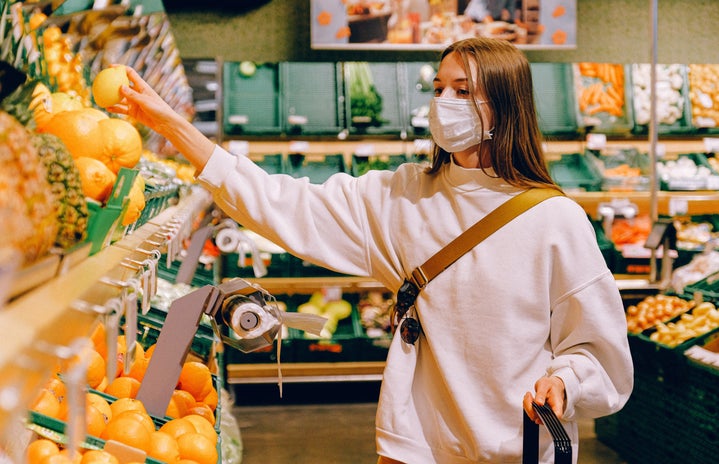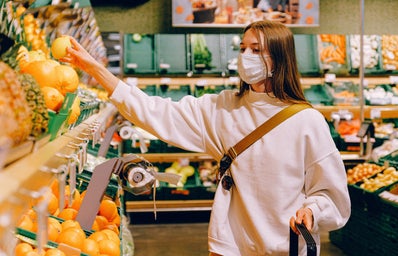Kylie Jenner, Birkin bags and the oh-so-ostentatious closets. Reaching the pinnacle of wealth seems to constantly be displayed by having things and subsequently showing them off. But what if I told you that appreciation for having less and thinking about how you spend your money is maybe, possibly, slightly more important than being like Kylie Jenner?
Everywhere we look stand reminders to consume, consume, consume: advertisements for “buy one get one free,” YouTube videos that showcase celebrity closets and TikTok video hauls of unnecessarily large amounts of clothing from Shein. While shopping and getting new things can be fun, over-consuming is an issue that everyone should be aware of.
Ethical consumption, by definition, means recognizing the power you have as a consumer to influence businesses and encourage them to be more sustainable, ethical and accountable. In short, this means thinking about where you spend your money when you do buy things.
This isn’t specifically asking you to deprive yourself of things that you may need, and it’s definitely not about getting bragging rights to show off how virtuous any given person is. This is meant to make you more confident in your purchases. Immediate perfection is not the goal, so here are a few tips I use to help myself become a more conscious and ethical consumer. Hopefully, this will give you some insight into how fun it can be to shop a little more carefully.
- Thrift or buy secondhand clothes
-
Everyone obviously needs clothes to wear — being stylish isn’t a bad thing, and buying new clothes to treat yourself isn’t inherently evil either. Buying in excess, on the other hand, can have long-term effects on the environment.
To practice sustainability when it comes to clothing, I like to buy things secondhand or thrifted. When given the opportunity, buying used clothes is a simple solution that most people can do!
A favorite place of mine in Columbus is Flower Child Vintage. Located within walking distance from campus, it has a ton of vintage pieces ranging from furniture to jewelry and clothes. It is fairly expensive, so when I’m looking for an inexpensive option, I like old-reliable: Goodwill.
If leaving your house isn’t an option, whether it’s because you don’t feel like it or because the pandemic made that impossible, you can always shop online. ThredUp is an online secondhand store that has a ton of options that you can peruse without leaving your bed. They have name-brand items, which makes it easier to find what you want instead of digging through racks and racks at a brick-and-mortar store.
Who knew being an ethical consumer could be so easy?
- Shop local
-
One thing that I love to buy locally is coffee! This is because I feel like local, small coffee businesses really care about ethically sourcing their beans.
Don’t get me wrong, I do believe there are occasions that call for Starbucks — whether out of convenience or because of the cost compared to pricey beans, it can be a go-to every once in a while.
On the other hand, discovering new coffee places in your town also helps you become more familiar with the area as a whole, and if you’re not from Columbus, it makes you feel more like a local.
One great coffee place in Columbus that takes sustainability into account is One Line Coffee. It’s located in the Short North, so it’s a bit of a walk, but that’s kind of what makes it fun. One Line Coffee gets their beans from many small farmers, and they preach the belief that you should be able to know exactly where your cup of coffee is sourced from.
In addition to One Line, there are so many local coffee places in the area that are worth supporting if coffee is your thing.
Whether or not you’re a coffee drinker, it’s always a good idea to support local restaurants when you’re craving takeout.
Places like Portia’s Cafe, where they use local and organic ingredients to provide good, sustainable food, are scattered throughout Columbus. Portia’s Cafe is a vegan, gluten-free and GMO-free restaurant, so if that interests you, you should try ordering there!
- Buy less
-
A new TikTok trend, in which people purchase as much clothing as they can afford from places like Shein, is a definite contributor to the problem of overconsumption.
Places like Shein are OK to buy from when it comes to smaller purchases; because it is inexpensive, it may be one of the few places many people can afford clothing from.
But some of these hauls showcase fifty or more items from Shein. These clothes go out of style quickly and don’t last that long, which leads to a pattern of constantly having to buy fifty or more items from Shein every time the season changes.
One suggestion is to simply buy less clothing and to splurge on longer-lasting, quality pieces that can withstand the test of time. The longer you can wear something, the better!
When I do own once-trendy pieces that have gone out of style, I have two options: throw them away or give them away. In an effort to be sustainable, I try to donate as much clothing as possible. It’s good to let your clothes have a second life.
When it comes to ethical consumption, the idea itself may seem overwhelming and unachievable, but that’s just not true! Thrifting, buying local and just buying less are only a few options, and I’m sure there are many more things one could do to achieve the same effect.
Society tells us that the key to happiness is having an over-abundance of expensive and nice things, but I’m here to tell you that thinking a little bit more about ethical consumption is a lot more rewarding, and a lot easier than trying to have a celebrity-sized closet.


